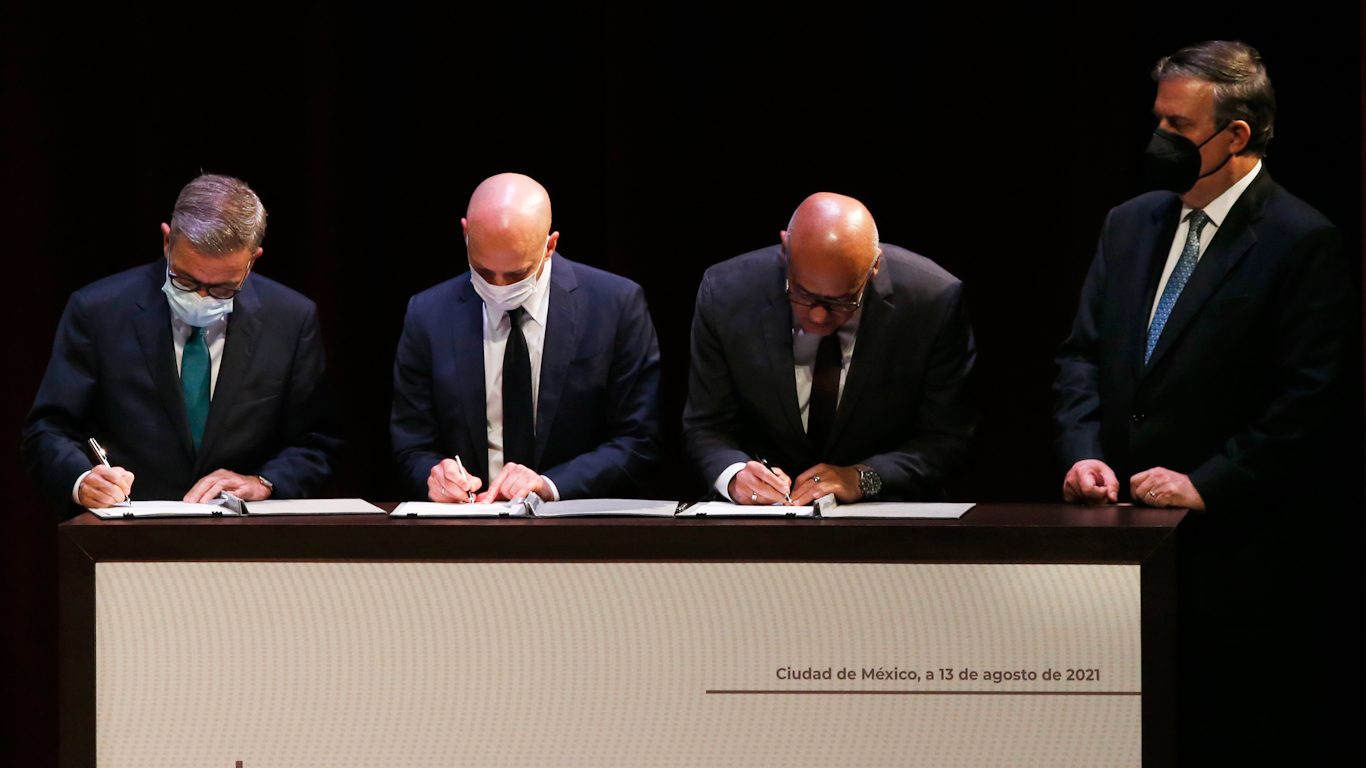MEXICO CITY — The government of Venezuela is engaged in negotiations with the country’s Western-backed opposition. The preliminary talks, which took place in Mexico City, are the first of their kind since Venezuela’s diplomatic team withdrew from previous dialogues, which took place in Barbados and Norway in 2019 after U.S. sanctions were tightened.
In a bid to lift sanctions, the Bolivarian government of Venezuela’s President Nicolas Maduro met with the Western-backed opposition of Juan Guaidó last week, with further talks planned to be held at a currently undisclosed location between September 3rd and 6th.
For the Venezuelan government, the primary goal is to negotiate a settlement under which economic sanctions would be lifted. As a first step towards that goal, a Memorandum of Understanding was agreed upon between the two sides, which will present a roadmap aimed at guiding the dialogue process. In addition to lifting sanctions, the Maduro government hopes to compel the United States and its allies to drop their recognition of unelected opposition leader Juan Guaido as president of Venezuela and to recognize the result of the country’s presidential elections.
Helping to facilitate these talks are the Netherlands and Russia. The latter is aiding Venezuela’s Bolivarian government and has helped President Maduro circumvent some U.S. sanctions. Russia’s involvement in particular has greatly aggravated Washington, which has long been wary of Russian involvement in South America. In 2020, Russian state-owned energy giant Rosneft Trading SA was sanctioned by the U.S. for brokering the sale and transport of Venezuelan crude oil.
Venezuelan Vice President Delcy Rodríguez announced that a phone call had taken place, this Wednesday, between himself and Russia’s Foreign Minister Sergei Lavrov, in order to communicate the appreciation of Venezuela for Russia’s role in the negotiations in Mexico. Russia’s Lavrov was reported as having pledged to further strengthen ties between the two nations.
Commenting on the talks, President Maduro said that they provide an “opportunity for the extremist opposition, which is backed by the United States and some European countries, to understand that the time for sabotage, coup, and interventionism is up,” adding, “They must return all assets, bank accounts, and dollars belonging to the Venezuelan people.”
Neocon calls for more pressure
Former Special Representative for Venezuela in the State Department (2019-20) and well-known neoconservative Elliott Abrams wrote a piece for The Hill voicing his dissatisfaction with President Joe Biden’s hands-off approach to Venezuela so far. He urged Biden to do more than keep U.S. sanctions in place and to get more involved with the opposition and the coming round of talks in September. “What we should not do is treat the Maduro regime as a legitimate government and permit it to send an ambassador to Washington,” Abrams stated.
There has been pushback in Washington from the other side of the argument, however, with Democrat Congressman Jesús “Chuy” García having gathered 18 signatures for a letter — forwarded to Biden’s secretary of state, Antony Blinken — calling for the lifting of sanctions.
Our policy towards Venezuela promotes suffering, not democracy. Along with @RepRaulGrijalva & 17 members of Congress, I sent a letter to @SecBlinken calling on the Biden Administration to lift sanctions, end politicization of US assistance & engage in direct diplomatic dialogue. pic.twitter.com/7LnoqZ9uOi
— Congressman Chuy García (@RepChuyGarcia) August 13, 2021
The U.S. has sanctioned Venezuela since the Bolivarian revolution led by former President Hugo Chavez in 1999. But since imposition of further sanctions and an attempted regime-change operation in 2019, when the Trump administration recognized opposition figure Juan Guaido as the president of Venezuela, the Maduro government has only increased in popularity among the Venezuelan electorate. Yet, Venezuela is experiencing an unprecedented economic crisis, to overcome which the 90-plus percent of the population who live in poverty desperately need the lifting of sanctions.
For the U.S. media, it’s clear that the role of Russia in these negotiations is a point of focus and that no answer to the question of Venezuela’s future will be judged legitimate unless it includes the fall of Maduro’s government. CNN is still calling the attempt to install opposition figure Juan Guaido as Venezuela’s president a “revolution,” but doubts the capacity of Guaido to get the job done. Other establishment media have argued that concessions can be squeezed out of the suffering Venezuelan government, using U.S. sanctions as a negotiating tool.
Western mainstream media have been quick to attack Venezuela’s Bolivarian government for its insistence on pursuing a solution to the country’s economic crisis and are behaving more hawkish than the current U.S. government.
Feature photo | Venezuelan opposition delegate Gerardo Blyde Perez, from left, Norwegian diplomat Dan Nylander, Venezuelan President of the National Assembly Jorge Rodriguez and Mexico’s Foreign Minister Marcelo Ebrard, attend talks in Mexico City, Aug. 13, 2021. Marco Ugarte | AP
Robert Inlakesh is a political analyst, journalist and documentary filmmaker currently based in London, UK. He has reported from and lived in the occupied Palestinian territories and hosts Press TV’s show ‘Palestine Files’. Director of ‘Steal of the Century: Trump’s Palestine-Israel Catastrophe’. Follow him on Twitter @falasteen47


